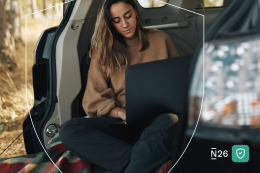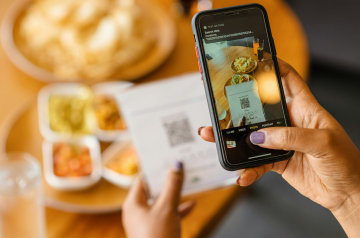
7 Tips for Working Safely Remotely
Are you a digital nomad or a remote worker? Here's how to keep your data safe while working on the go.
5 min read
Whether you’re working remotely from a coffee shop, camper van, park, or beach cafe, choosing where and how you work can be incredibly liberating. But as they say, with great freedom comes great responsibility. Your privacy can be more at risk when you’re working on the go. Thankfully, there are plenty of ways you can safeguard yourself against any potential risks. Here are seven ways to work more safely remotely.There are plenty of perks to working outside of an office setting. Choosing where—and even when—you work often means more control over your work/life balance. Plus, just because you’re working remotely doesn’t mean you have to forgo the sense of community often created in an office. With co-working spaces cropping up all over the world, it’s easy to find other digital nomads and like-minded remote workers wherever you go.When working remotely, it’s important to consider your safety, security, and wellbeing. From making sure your operating system is up-to-date to ensuring you’re looking out for your physical health, here are a few top tips to make sure you're working safely remotely.One of the most important and often-overlooked ways to secure your privacy when working remotely is to ensure that your operating system is up-to-date. With each operating system update, new security patches are rolled out. These patches protect against recently identified vulnerabilities that potential hackers could exploit. To guarantee you never miss an update, opt for your system to update automatically so you don’t have to do it manually.In general, try to avoid joining public WiFi if you can. While you can control the security of your home network, there’s not much you can do about the network security in a local coffee shop. If the public network you’re using isn’t secure and you access an encrypted website, it’s possible that other users on the network could observe your activity and steal your login details. In the worst-case scenario, hackers on the public network could gain access to huge amounts of your personal data, including private documents, login details, and contacts. It’s much more secure to access the internet by turning your mobile into a private hotspot instead. If you have to use public WiFi, you can increase your security by using a virtual private network (VPN). A VPN essentially re-routes the connection from your computer and the WiFi channel you’re using through a VPN’s private server. This hides the location of your connection and, since the signal between your computer and the VPN is encrypted, it makes it more difficult for hackers to access your data. While there are many free VPN options out there, these may not be as secure or as fast as some slightly more expensive models. Be sure to do your research to find a VPN that works well for you.Perhaps one of the most unsettling attacks cyber hackers have at their disposal is the ability to hack your webcam. This means that they can watch your remote meetings, identify your surroundings, and in some cases record and blackmail you—even while you think your webcam is switched off. To protect yourself against such hacks, be sure to unplug your webcam if it’s a separate device, or invest in a sliding webcam cover if your webcam is built into your computer. These covers give you the added security of knowing that even if a hacker did manage to hijack your webcam, they’d only be able to access a black screen.Your security may not only be at risk while online—some savvy hackers may also attempt to look at your screen over your shoulder. Yes, this might sound a little paranoid, but it’s always a good idea to take in your surroundings when working online, especially if you’re accessing personal information that an opportunistic criminal could steal. If you can, position yourself so that there’s a wall behind you. That puts you in the best position to avoid prying eyes!For the ultimate in remote working security, consider investing in some anti-virus software. This kind of software protects you against vicious malware, hacking attacks, spyware, phishing scams, and ransomware attacks. It also buys you peace of mind—you can feel more confident that your computer is well-protected against many online threats. Viruses and hacks can not only steal your data, but they can also slow down your computer, reformat your hard disk, and essentially freeze your computer so you’re unable to perform any task.
So, you’ve done everything to protect your data when working on the go—now, what about you? Humans didn’t evolve to spend eight hours a day sitting stooped over a screen! “Tech neck” is a relatively new phenomenon that’s caused when the muscles of the neck, shoulders, and upper back spend long periods hunched up, resulting in headaches, stiffness, pain, and sometimes even a slipped disc. That’s why it’s essential to think about ergonomics when choosing your workspace for the day. If you can, try to find a chair that provides ample support to the lower back, stretch the muscles in your neck and shoulders regularly, and take breaks often.
At N26, we take security seriously. As a fully digital bank, we send you push notifications every time a transaction is made on your account so you can catch any fraudulent activity as it happens. Plus, your N26 Mastercard is protected with 3D Secure technology, so 2-factor authentication is required before any purchase is made. If you spot any suspicious activity on your account, you can immediately lock your card in the app and contact our Customer Support team for help replacing your card and making a claim to get your fraudulent transaction refunded. Find the account that’s right for you and open an account in minutes.
The perks of working on the go
How to work safely on the go
1. Update your operating system
2. Avoid public WiFi
3. Install a VPN
4. Invest in a sliding webcam cover
5. Check your surroundings
6. Use anti-virus software
7. Don’t ignore your physical health
Your money at N26
Find similar stories
BY N26Love your bank
Related Post
These might also interest youTECHNOLOGY & SECURITYHow N26 will contact you — and how we won’t Scammers and fraudsters may pose as representatives of N26 to try to steal customer data. Here, we dive into how N26 will and won’t contact you, so that you can spot the scams.
10 min read
TECHNOLOGY & SECURITYWhy every day is April Fools’ Day for fraudstersToday’s scams look, sound, and feel real — until your money disappears. Here’s how to keep your finances safe.
5 min read
TECHNOLOGY & SECURITYHow scammers are using QR codes to steal your dataNot all QR codes are harmless. Here’s what to look out for to avoid falling for a “quishing” scam.
4 min read


